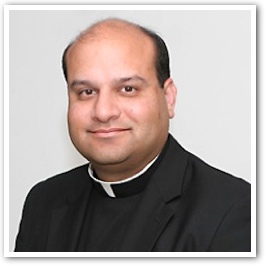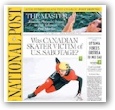What is free speech for?
- FATHER RAYMOND J. DE SOUZA
It's always a rollicking good time when Mark Steyn is back in our pages, as he was yesterday, interviewed by our colleague Joe Brean on free speech after the Charlie Hebdo massacre.
 The "famously witty cultural doomsayer" — Brean's apt characterization — argued for maximum free speech as the only suitable response to the terrorists.
The "famously witty cultural doomsayer" — Brean's apt characterization — argued for maximum free speech as the only suitable response to the terrorists.
"Free speech has to include the right to insult Islam," Mr. Steyn said. "Not because necessarily anyone approves of insulting Islam, but simply because free speech by definition is for the stuff you don't approve of. And that is why it's important for deeply observant Catholics to recognize that a foulmouthed beery comedian on open-mike night in Hamilton has the right to urinate all over the Catholic Church. Not because it's a good thing to do, and not because you approve of what he's saying, but because free speech is in the end for all the stuff you revile and that offends you. So when the CBC say they're not going to show these critical elements of a news story because it will offend people, they are on the wrong side."
I do get to Hamilton a few times a year but, alas, never to its beer-sodden comedy clubs. Instead, I demonstrate my broadmindedness about anti-Catholicism by listening to the CBC itself, which provides it in sufficient measure to balance off the kid-gloves treatment it gives to Islam; free speech can be degraded by an aspiring performer/entrepreneur or lavishly funded by my tax dollars.
The key question raised by the Charlie Hebdo aftermath is whether free speech is part of a deeper conception of liberty and the common good — and therefore we defend its abuses — or contrariwise, it is only the mere indulgence of "expressive individualism," as Princeton professor Robert George has christened the dominant ethos of our decadent age. In which case, why bother? In short, what is free speech for? If free speech is solely to be defended as an autonomous good in its own right, and therefore the more free it is — i.e., offensive, outrageous — the better, then it will be difficult to build a robust consensus to defend it. If the core defence of liberal values amounts to little more than an identification with blasphemous rudeness, then we ought not be surprised that it is does not persuade those who have come from more illiberal cultures.
Free speech is properly understood as part of a broader set of liberties rooted the nature of the human person. That's why Steyn argues for the full heritage of Western liberty, going back to Magna Carta, the 800th anniversary of which we mark this year. The Magna Carta begins with religious liberty, because it was precisely that Christian heritage of reflection on the origin and destiny, creation and vocation of the human person which gave rise to the recognition of man's dignity as the secure foundation for human rights.
While understandable in a traumatized hashtag culture, Je suis Charlie is more of an abandonment of our heritage of liberty than a defence of it. To identify with the atheistic nihilism of Charlie Hebdo, even if it were judicious rather than juvenile, is to insist on free speech just for the sake of free speech, without any compelling account of the human person or human society in which to ground human liberties.
Europe needs Mark Steyn more than we do. Not only to defend free speech, but to remind them for what purpose it needs to be defended in the first place.
What died in Paris was more than the cartoonists at Charlie Hebdo. The incapacity of most of Europe to articulate anything more than a thin expressive individualism meant that the European idea — rooted in the meeting of biblical wisdom with Greek philosophy, shaped in turn by the Enlightenment — is dead.
The Economist newspaper, a reliable barometer of a certain cast of the respectable European mind, was completely at sea on Charlie Hebdo, reluctantly allowing that "there may well be a connection between Paris and foreign jihad." Yes, there may well be. Even worse, about the issues raised by the Charlie Hebdo killings, the editors wrote: "One is free speech, and whether it should have limits, self-imposed or otherwise. The answer to that is an emphatic no."
We can agree to argue against state limits on speech. But to argue against "self-imposed limits" is to argue for the abandonment of responsibility, let alone virtue. To argue for free speech untethered from virtue is akin to insisting that supporting the constabulary includes defending police beatings.
Europe needs Mark Steyn more than we do. Not only to defend free speech, but to remind them for what purpose it needs to be defended in the first place.
 This is Meaghen Gonzalez, Editor of CERC. I hope you appreciated this piece. We curate these articles especially for believers like you.
This is Meaghen Gonzalez, Editor of CERC. I hope you appreciated this piece. We curate these articles especially for believers like you.
Please show your appreciation by making a $3 donation. CERC is entirely reader supported.

Acknowledgement
 Father Raymond J. de Souza, "What is free speech for?" National Post, (Canada) January 27, 2015.
Father Raymond J. de Souza, "What is free speech for?" National Post, (Canada) January 27, 2015.
Reprinted with permission of the National Post and Fr. de Souza.
The Author
Father Raymond J. de Souza is the founding editor of Convivium magazine.
Copyright © 2015 National Post



